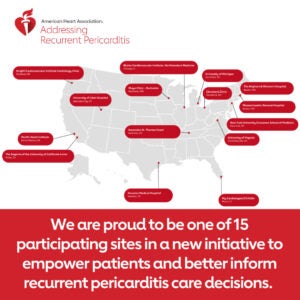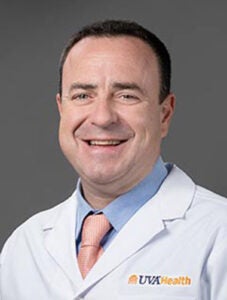

UVA Health Joins New Nationwide Initiative to Empower Recurrent Pericarditis Patients
Did you know about 40,000 people in the United States experience recurrent pericarditis, or inflammation of the sac-like structure that protects the heart? The condition can cause chest pain and may lead to fluid buildup around the heart muscle.
'Relentless Force'
Now, UVA Health has become one of 15 participating sites across the country to join a new American Heart Association (AHA) initiative to empower patients and equip healthcare providers with up-to-date science to inform recurrent pericarditis care decisions.
The Addressing Recurrent Pericarditis initiative, supported by Kiniksa Pharmaceuticals, aims to improve diagnosis, treatment, and quality of life for those with the condition. UVA Health will work to implement initiative activities, improve performance and quality of care, and support the AHA’s mission to be a "relentless force" for longer, healthier lives.
Renaissance of Research
Cardiologist Antonio Abbate, MD, PhD, is on AHA’s Eastern States Board of Directors and has helped UVA Health become one of the 15 sites that are part of the initiative.
“I am very excited about this initiative,” says Dr. Abbate, who specializes in cardio-immunology and cardio-oncology — evaluating and treating people with heart inflammation (pericarditis and myocarditis), and those at risk for heart complications due to cancer treatment at the UVA Health Heart and Vascular Center. “Until recently, pericarditis has been poorly studied, and it is still now often inappropriately treated. The past decade has seen a renaissance of basic and clinical research in pericarditis allowing for the identification of the mechanism of the disease and new targeted therapies.”
Dr. Abbate also serves as the Ruth C. Heede Professor of Cardiology at UVA School of Medicine’s Robert M. Berne Cardiovascular Research Center, and is a Fellow of the AHA, American College of Cardiology, and European Society of Cardiology.
Pericarditis can be attributed to several factors including viral, bacterial, fungal and other infections; possibly heart attack or heart surgery; radiation; lung or breast cancer; injuries; and medications. The condition can develop suddenly and typically doesn’t last long — or it may be “recurrent” or "chronic," lasting longer than three months.
Latest News





